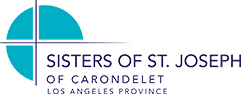The COVID19 virus has dominated our minds, hearts, conversations, media and decisions for the last few weeks. The news media lets us know the truths and untruths of how this virus is handled or not handled. I am encouraged to “not panic” but around me, I see people buying up hand sanitizer, toilet paper, cloth sanitizers. I want to share with you some thoughts from Ron Rolheiser, OMI and Henri Nouwen that invited me to “not panic” but to “steady the course” as I navigate this COVID19 worldwide event. Perhaps it might support you as you challenge yourself to live intentionally the CSJ charism of loving God and Neighbor inclusively.
Rolheiser and Nouwen write: When Jesus proclaims in the Gospels, “Repent and believe in the Good News,” our biblical translations do not do justice to what Jesus is saying. English translations of the Gospels use “repent” for “metanoia.” The word “repent” has different connotations from what Jesus intended. In English, repentance implies that we have done something wrong and must regretfully disavow ourselves of that action and begin to live in a new way.
The biblical word, “metanoia”, has much wider connotations. “Metanoia” comes from two Greek words: Meta, meaning above; and Nous, meaning mind. “Metanoia” invites us to move above our normal instincts, into a bigger mind. A mind that rises above the proclivity for self-interest and self-protection which so frequently trigger feelings of bitterness, negativity, and lack of empathy inside us. “Metanoia” invites us to meet all situations, however unfair they may seem, with understanding and an empathic heart. “Metanoia” stands in contrast to paranoia. In essence, metanoia is “non-paranoia.” Jesus’ opening words in the Synoptic Gospels might be better understood as Be un-paranoid and believe that it is good news. Live in trust!
Henri Nouwen, in his book entitled, With Open Hands, describes the difference between metanoia and paranoia. He suggests that there are two fundamental postures with which we can go through life. We can go through life in the posture of paranoia. The posture of paranoia is symbolized by a closed fist, by a protective stance, by habitual suspicion and distrust. Paranoia has us feeling that we forever need to protect ourselves from unfairness, that others will hurt us if we show any vulnerability, and that we need to assert our strength and talents to impress others. Paranoia quickly turns warmth into cold, understanding into suspicion, and generosity into self-protection. The posture of “metanoia” is seen in Jesus on the cross. There, on the cross, Jesus is exposed and vulnerable, his arms spread in a gesture of embrace, and his hands open, with nails through them. This is the opposite of paranoia, where our inner doors of warmth, empathy, and trust spontaneous slam shut whenever we perceive a threat. Metanoia, the meta mind, the bigger heart, never closes those doors.
I suggest that this movement from paranoia to metanoia is what Medaille and the six women embraced and called “the more.” During our encounters with the Dear Neighbor during this COVID19 time, be “un-paranoid” and believe in the Good News.
Ron Rolheiser’s reflections can be found at this link if you are interested.




